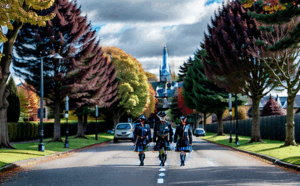Recent anti-immigration demonstrations across Tayside, including significant events in Perth and Dundee, are placing considerable strain on Police Scotland’s resources, according to the force’s Chief Constable, Jo Farrell. This intensified operational environment is notably affecting the work-life balance of officers, with many reportedly losing designated rest days to cover these public order duties.
Chief Constable Farrell highlighted the scale of the challenge during a recent public meeting of the Scottish Police Authority Board in Edinburgh. She revealed that just over one recent weekend, almost 300 officers were deployed to manage various protest activities across Scotland. These deployments stretched across key areas such as Glasgow, Falkirk, Dundee, and importantly for our local community, Perth.
The protests in Perth, particularly one tense standoff outside the Radisson Blu Hotel on Leonard Street in August, saw approximately 300 individuals participating in both anti-immigration rallies and counter-protests. Similarly, Dundee has witnessed repeat demonstrations, such as those at Alloway Terrace, where two men were recently charged following protest activity. Earlier events at the same Dundee location had already escalated to include the throwing of eggs, necessitating a more robust police presence in subsequent gatherings to keep opposing groups separate. The Cost of Maintaining Public Order
The impact of these ongoing demonstrations extends beyond just maintaining public order. Chief Constable Farrell underscored the significant financial cost to Police Scotland and the personal toll on its workforce. Officers are often required to cancel their rest days, directly affecting their well-being and ability to recuperate. This reallocation of personnel is a critical concern, as it directly impacts the force’s capacity to perform its core duties.
Even as resources are diverted to manage protest lines, the fundamental responsibilities of policing do not diminish. Officers must concurrently continue to investigate serious crimes, ranging from murders and attempted murders to terrorism offences and child sexual abuse. The Chief Constable emphasized that despite the demands of protest management, the force remains committed to securing justice for families and bringing offenders to account, citing recent arrests linked to significant incidents and ongoing operations like Operation Portaledge. Adapting to Modern Challenges
Beyond the immediate pressures of public protests, Police Scotland is also actively working to enhance its capabilities in other rapidly evolving areas of crime. The Chief Constable mentioned enforcement actions against retail crime and drug offences, indicating a broad scope of operational challenges. Furthermore, the force is collaborating with academic institutions, such as Abertay University’s cyberQuarter, to develop cutting-edge strategies and expertise to combat increasingly complex cyber-crime threats. This proactive approach ensures that while responding to immediate visible challenges, the police are also preparing for future criminal landscapes.
For residents of Perth and Kinross, the implications are clear: local policing resources, while dedicated, are finite. The commitment of officers to maintain peace and safety in the Fair City, from routine patrols to responding to critical incidents, is being tested. The ongoing nature of these large-scale public events requires careful consideration of how policing is funded and resourced to ensure the safety and security of all communities across Tayside, including our own.
Chief Constable Farrell highlighted the scale of the challenge during a recent public meeting of the Scottish Police Authority Board in Edinburgh. She revealed that just over one recent weekend, almost 300 officers were deployed to manage various protest activities across Scotland. These deployments stretched across key areas such as Glasgow, Falkirk, Dundee, and importantly for our local community, Perth.
The protests in Perth, particularly one tense standoff outside the Radisson Blu Hotel on Leonard Street in August, saw approximately 300 individuals participating in both anti-immigration rallies and counter-protests. Similarly, Dundee has witnessed repeat demonstrations, such as those at Alloway Terrace, where two men were recently charged following protest activity. Earlier events at the same Dundee location had already escalated to include the throwing of eggs, necessitating a more robust police presence in subsequent gatherings to keep opposing groups separate. The Cost of Maintaining Public Order
The impact of these ongoing demonstrations extends beyond just maintaining public order. Chief Constable Farrell underscored the significant financial cost to Police Scotland and the personal toll on its workforce. Officers are often required to cancel their rest days, directly affecting their well-being and ability to recuperate. This reallocation of personnel is a critical concern, as it directly impacts the force’s capacity to perform its core duties.
Even as resources are diverted to manage protest lines, the fundamental responsibilities of policing do not diminish. Officers must concurrently continue to investigate serious crimes, ranging from murders and attempted murders to terrorism offences and child sexual abuse. The Chief Constable emphasized that despite the demands of protest management, the force remains committed to securing justice for families and bringing offenders to account, citing recent arrests linked to significant incidents and ongoing operations like Operation Portaledge. Adapting to Modern Challenges
Beyond the immediate pressures of public protests, Police Scotland is also actively working to enhance its capabilities in other rapidly evolving areas of crime. The Chief Constable mentioned enforcement actions against retail crime and drug offences, indicating a broad scope of operational challenges. Furthermore, the force is collaborating with academic institutions, such as Abertay University’s cyberQuarter, to develop cutting-edge strategies and expertise to combat increasingly complex cyber-crime threats. This proactive approach ensures that while responding to immediate visible challenges, the police are also preparing for future criminal landscapes.
For residents of Perth and Kinross, the implications are clear: local policing resources, while dedicated, are finite. The commitment of officers to maintain peace and safety in the Fair City, from routine patrols to responding to critical incidents, is being tested. The ongoing nature of these large-scale public events requires careful consideration of how policing is funded and resourced to ensure the safety and security of all communities across Tayside, including our own.


